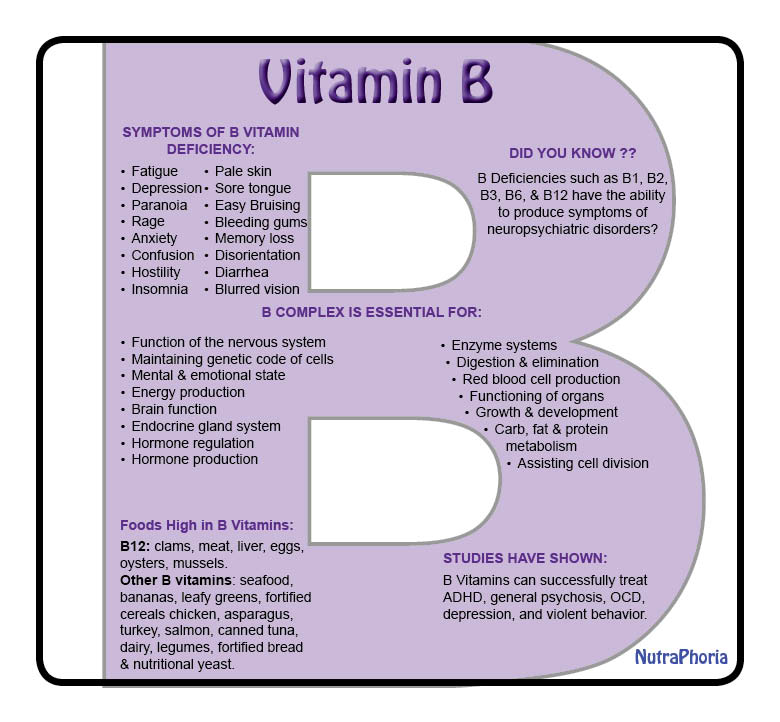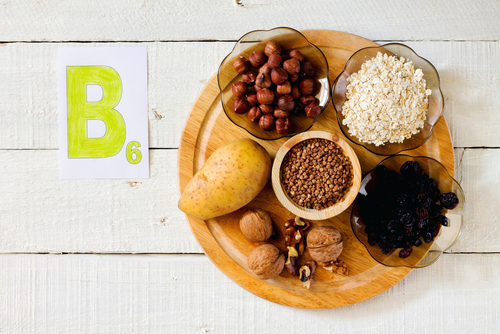Are you getting enough B’s?
Did you know that being deficient in vitamin B-12 can damage your central nervous system and lead to nerve pain? B-12 plays an essential role in our health and normal metabolic function, and is critical to the production of red blood cells and proper functioning of nerve cells. Severe B-12 deficiency can lead to damage of nerve cells, causing walking difficulties, mood changes, tingling or numbness in the fingers and toes, depression, memory loss, disorientation and dementia.
There are 8 different B vitamins: Thiamine (B1), riboflavin (B2), niacin (B3), pantothenic acid (B5), pyridoxine (B6), biotin (B7) folate (B9), and cobalamins (B12). B vitamins are water soluble which means they are not stored in the body, and must be consumed regularly through the diet.
B’s and Methylation:
The B vitamins B6, B12, and folate are co-factors in an critical cellular process called the methylation cycle which is a biochemical pathway that manages or contributes to a range of functions, including detoxification, energy production, mood balancing, inflammation control, DNA maintenance, and immunity.
If your body is not methylating efficiently, you end up accumulating abnormal levels of toxic heavy metals which are found in food, water, beauty products, and the environment.
When levels of these key B vitamins are low, blood levels of homocysteine rise. High homocystein levels have has been shown in numerous studies to significantly increase the risk for heart disease, and has also been implicated as a risk factor for stroke, dementia, and Alzheimer’s.
Who’s at Most Risk for Deficiency?
Those suffering from IBS, Chrohn’s disease or celiac disease and/or have abnormal bacterial growth in the gut.
Those who lack intrinsic factor, which is a protein secreted by the stomach that is necessary for absorption of vitamin B-12. Lack of intrinsic factor may be due to an autoimmune reaction, or it may be inherited.
Vegans, and vegetarians – especially B12.
How to Get More B’s in Your Diet:
B12: Nutritional yeast is an awesome way for vegans and vegetarians to get B’s – and the added boost of energy they provide. The other sources include animal products such as fish, poultry, meat, eggs, dairy.
Vtamin B6: tuna, banana, salmon, turkey, grass fed beef, beans, spinach, kale, sweet potato, hazelnuts, oranges papayas, beans, & cantaloupe.
Folate: fruits and vegetables, whole grains, beans, fortified grains & breakfast cereals. Keep in mind fortified foods have folic acid (synthetic form of folate), so it is best to avoid foods that are heavily fortified and opt for whole food sources.
Thiamine: Pork, ham, dark green leafy vegetables, green pea, lentils, almonds, pecans fortified whole-grain cereals, wheat germ, enriched rice.
Riboflavin: Spinach and other dark green leafy vegetables, asparagus, eggs, chicken, fish.
Biotin: Eggs, almonds, legumes, salmon, swiss chard, pork and avocado.
Niacin: Chicken, turkey, fish, legumes, peanuts, pasta, whole wheat.
Pantothenic Acid: Yogurt, avocado, lentils, split peas, mushrooms, sweet potatoes, broccoli.



